Action for Primates
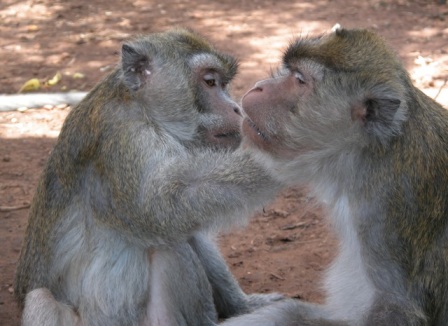
|
Action for Primates |

|
|
The following are news items we have posted in 2025. See elsewhere for news from other years.
Index of news items; select date & title to access:
22 November 2025: Major turnaround by CITES has raised concerns about plight of long-tailed macaques
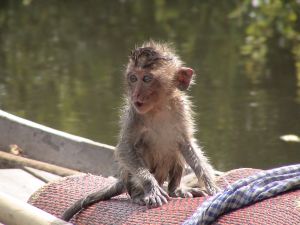
The 79th meeting of the Convention on International Trade in Endangered Species of Wild Fauna and Flora (CITES) Standing Committee takes place this week in Uzbekistan. At the meeting, crucial decisions are to be made that will impact the future of the long-tailed macaque (Macaca fascicularis), a non-human primate species whose conservation status was only recently reaffirmed as Endangered by the International Union for Conservation of Nature's (IUCN) Red List. This follows despite the research and toxicity (poisoning) testing industry having contested the original IUCN reclassification of the species from Vulnerable to Endangered.
The long-tailed macaque is facing a high risk of extinction in the wild, raising serious concerns about the continued negative impact of international trade. It is the most heavily traded non-human primate species and the most widely used for research and toxicity testing. Concerns relating to the trade in long-tailed macaques in several exporting countries, including Cambodia, Vietnam, Lao People's Democratic Republic (Lao PDR), the Philippines and Indonesia, have been the subject of consideration at CITES for several years.
Action for Primates, with other wildlife and conservation groups, has for many years been pushing for greater conservation protection for the long-tailed macaque in Cambodia and neighbouring countries, raising concerns about the credibility of captive-breeding claims, the conservation status of the species and the impacts of increasing international trade on that status.
We are alarmed that within just a few months, the CITES Secretariat has gone from recommending that all trade in long-tailed macaques from Cambodia be suspended to recommending that Cambodia is now removed from an important CITES Review (the Review of Trade in Animal Specimens Reported as Produced in Captivity) that placed the trade and credibility of captive-breeding claims under scrutiny. There has been a large expansion in the macaque industry in Cambodia with 13 licenced long-tailed macaque facilities, four of which are under construction. The CITES secretariat has also recommended that Vietnam and the Philippines be removed from this Review.
The original recommendation made by the CITES Secretariat to suspend trade from Cambodia followed concerns raised during a five-year US Fish and Wildlife Service (USFWS) investigation into monkey trafficking. A subsequent trial provided compelling evidence of large-scale laundering of wild-caught long-tailed macaques in Cambodia as captive-bred, as well as an illegal trade from black-market sources in Thailand. It was revealed that the macaques were being falsely labelled as captive-bred at Cambodian facilities and exported to the USA to supply the demand from US primate import and user companies. Although Masphal Kry, Deputy Director of the Department of Wildlife and Biodiversity, was found not guilty on conspiracy and smuggling charges, evidence of the role of the Cambodian Ministry of Agriculture, Forestry and Fisheries in the allocation of quotas and the collection and delivery of wild macaques was presented.
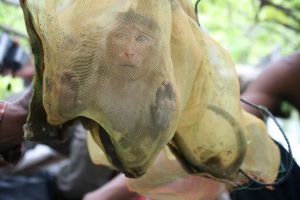
The Species Survival Network's Primate Working Group, supported by the Born Free Foundation, International Primate Protection League, Action for Primates and others, is urging that Cambodia should be retained in the Review. A briefing document has been submitted to the CITES Secretariat, Standing Committee Members and Animals Committee Chair, highlighting key concerns including: 1) the lack of a scientifically robust non-detrimental finding (NDF) to support Cambodia's claim that taking long-tailed macaques from the wild has not been detrimental to wild populations; 2) the biologically improbable high breeding rates claimed by Cambodian macaque farms—the explanation provided by Cambodia is based on claims that each breeding female can give birth to up to three offspring every two years; 3) the continuing use of an unreliable method—removable neck tags—to identify individual monkeys; and 4) evidence of an ongoing illegal trade. Most recently, there was an attempt to smuggle macaques from Thailand into Cambodia with 143 long-tailed macaques found stuffed into blue nylon mesh bags near the Cambodian border.
The trade in long-tailed macaques from Lao PDR is also due to be discussed by the forthcoming CITES Standing Committee. In February 2025, the Committee agreed to maintain a trade suspension with Lao PDR for all CITES-listed species for commercial purposes, until various recommendations were met. This suspension included the trade in long-tailed macaques, who are held at several facilities in the country.
The Species Survival Network's Primate Working Group has also submitted a briefing document to CITES urging the Standing Committee to maintain the trade suspension for the long-tailed macaque in Lao PDR. We are particularly concerned about 1) an escalation in the reported breeding and trade of long tailed macaques; 2) the source of macaques at supply facilities—which have recently increased in number—and whether the monkeys have come from the wild; 3) the reliability of a population survey used as the basis for the submitted NDF; 4) the subsequent downgrading of the protected status of long-tailed macaques in Lao PDR; and 5) the validity of CITES permits following the discovery of false and invalid documents between Lao PDR and Myanmar (including the recent fraudulent import of 500 macaques from Myanmar by Lao PDR).
Investigation of the macaque trade in Cambodia was the subject of a Bloomberg documentary in 2024: "The Dirty Business of Monkey Laundering | Bloomberg Investigates".
CITES is an international agreement between governments, whose aim is to ensure that international trade in wild animals and plants does not threaten the survival of the species.
18 November 2025: Monkeys suffer in disturbing Chinese research to simulate weightlessness in space
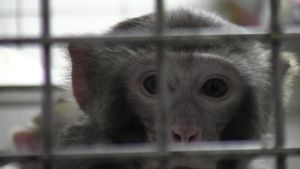
In this disturbing experiment, Chinese researchers subjected six adult male rhesus macaques to severe restraint in order to mimic weightlessness (microgravity) experienced by astronauts and look at how long-term microgravity can alter the brain's structure, and affect cognition and other behaviours (Wang et al 2025). This inhumane experiment was approved by the Experimental Animal Management and Use Committee of the China Astronaut Research and Training Center.
The macaques were secured to beds by a specialized cloth
which prevented them from shifting their body, although they could move their arms and legs to a limited degree. The beds were tilted -10 degrees so that the macaques were left in a head down position. The macaques were kept immobilised in this abnormal and highly restricted state all day and night, for 42 days.
Three days before bed restraint and at 21 and 42 days after this, the macaques were injected with ketamine in order to do magnetic resonance imaging (MRI). No information was provided on the physical or psychological impact 42 days of continual forced restraint in a head down position had on the monkeys or the fate of the animals at the end of the experiment.
Nothing was learned from this 'research' that was not already known in humans or could not be ethically derived from humans who are involved in space travel. The public are repeatedly told that non-human primates are used in research only when absolutely necessary and only when there are no other alternatives available. This inhumane experiment demonstrates the meaningless nature of such assurances.
Reference:
Wang, Jiarui; Dong Zheng; Chenhao Zhao; Xuan Xuan; Xiaoyun Zhang; Ruyue Li; Kai Xu; Yawei Zeng; Youping Tao; Dongxu Lu; Li Liu; Suping Zhao; Yanli Liu; Jigong Wu and Juan Du 2025-10-24 Long-term effects of simulated microgravity in the central nervous system of rhesus monkeys: a voxel-wise multimodal MRI study Frontiers in Physiology 16:1634366
06 November 2025: Baboons subjected to major blood loss in military research in USA
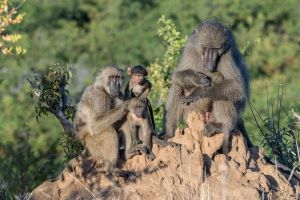
Twelve adult male baboons were subjected to invasive surgery and major loss of blood at the Texas Biomedical Research Institute (Arshad et al 2025). The work was funded by the US taxpayer through the Department of the Air Force under Air Force Contract No. FA8702-15-D-0001.
The baboons were severely deprived of any meaningful social enrichment by being kept singly in cages, were subjected to anaesthesia to insert catheters into various blood vessels. While under anaesthesia, as much as 40% of their blood was removed to cause haemorrhagic shock—a critical medical condition that results from significant blood loss. The blood was then reinjected into the baboons in order to "resuscitate" them. The baboons were allowed to recover from the anaesthesia and returned to their solitary cages. There was no mention of the impact such a procedure had on the baboons, physically or mentally, nor was their ultimate fate stated.
Nothing was learned from this experiment that was not already known from extensive observations on human trauma victims. The researchers were simply trying to 'improve' their 'model' of major blood loss. This is another striking example of researchers blatantly ignoring the 3Rs, something to which they claim to adhere.
It was clear that the researchers had no interest in the baboons for the sentient and sensitive individuals they were—subjects of a life that was important to each individual—nor was there shown any demonstrable concern for any suffering the baboon endured.
When will we stop viewing other species as "models" of ourselves, subjecting them to unbelievable cruelty and suffering, willing to do to them things we would never consider doing to each other?
Reference:
Arshad, Saaid H.; Carmen Hinojosa-Laborde; Eric J. Snider; Brian A. Telfer and Victor A. Convertino 2025-09-16 Monitoring of hemorrhage and whole blood resuscitation in non-human primates npj Biosensing 2:31
29 October 2025: Long-tailed macaques subjected to cruel whole eye transplantation in China
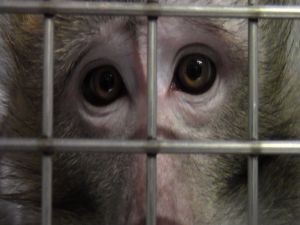
Four long-tailed macaques were subjected to gruelling surgery to remove an eye and replace it with an eye from other individuals who were killed to get the 'donor' eyes (Zhong et al 2025). The work was done at Sun Yat-sen University in China.
The surgery involved cutting out the entire eye and surrounding tissues such as the eyelids from the 'donor' macaque. The same was done in the the recipient macaque. Microsurgical technique was used to connect the major blood vessels of the donor eye in the recipient's orbit. After this brutal surgery, the macaques were isolated in steel cages. Although pain relief was provided medically, there is no way to ameliorate all pain after such surgery and we have no doubt that the macaques suffered as a result. Furthermore, the macaques would have no understanding why there were able to see one day and then were blind on the operated side the next.
Not only was this an incredibly inhumane treatment of these macaques, it was doomed to failure in terms of vision, as has been shown by the same procedure having been done on human volunteers. Rejection of the transplanted macaque eyes occurred by 19 days despite triple immunosuppressive therapy
, at which time the macaques were killed. During this period, the transplanted eyes were completely non-functional with respect to vision, primarily because the connection to the brain—the optic nerve— cannot be made.
These macaques suffered substantially due to imprisonment in captivity; subjection to highly invasive and painful surgery; postoperative pain; and the inflammation incurred as a result of eye rejection. Nevertheless, these researchers want to continue developing this model
, subjecting an unknown number of additional macaques to this immoral treatment.
Reference:
Zhong, Liuxueying et al 2025-10-27 "Allogeneic Whole Eye Transplantation in Macaques Achieves 19-Day Graft Survival with Structural and Functional Viability" American Journal of Ophthalmology in press
11 October 2025: Long-tailed macaques remain listed as Endangered by the IUCN
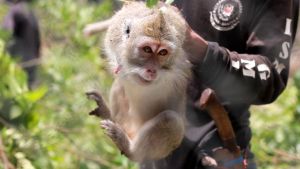
The conservation status of the long-tailed macaque remains Endangered on the International Union for Conservation of Nature (IUCN) Red List of Threatened Species following a challenge by the animal research industry. There has been a population decline over the past 30 years due to habitat loss and high levels of exploitation, including by the global trade for research and toxicity (poisoning) testing. This decline is expected to continue as the many threats faced by the species have not been mitigated.
The IUCN Red List is a critical inventory of the global conservation status and extinction risk of species. It originally reclassified the status of the long-tailed macaque from Vulnerable to Endangered in March 2022. This was based on the degree of exploitation of the species, including their global trade; use as 'pets'; for 'entertainment', including the filming of abused baby macaques to post on social media platforms; for human consumption; killing because of negative interactions with people. These, together with ongoing habitat destruction, were decimating wild populations of long-tailed macaques globally.
In 2024, the National Association for Biomedical Research, a pro-animal-research lobbying group funded by the industry, challenged this assessment. No doubt concerned by the potential impact that the new Endangered status could have on the protection of long-tailed macaques in source countries, and the negative impact that could have on the supply of macaques to primates importers and users in the USA, it filed a petition with the IUCN to downlist the species.
The long-tailed macaque is the most heavily traded non-human primate species and the most widely used in laboratories. The trade in the species has developed into an industrialised scale enterprise focused within native habitat countries in Southeast Asia, in particular Cambodia, Vietnam, Lao PDR, Indonesia and the Philippines, and other countries, such as China and Mauritius, with hundreds of thousands of macaques exported in recent years. The countries using the most long-tailed macaques are the US, China, Europe, Japan and Canada.
We must act today to ensure a future for long-tailed macaques. We urge governments to enact legislation that prevents the exploitation of and provides protection to their long-tailed macaque populations.
For further information: https://www.iucnredlist.org/species/12551/273015436#assessment-information
21 September 2025: Marmosets made pregnant, then killed in virus research in Japan
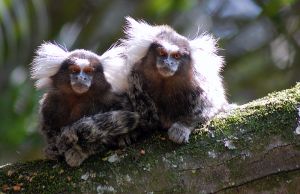
Female common marmosets were used to study effects of Zika virus on reproductive tissue in an experiment at the Hamamatsu University School of Medicine in Japan (Imagawa et al 2025). The work was supported by the Japan Agency for Medical Research and Development and through a scholarship donation from Yakult Co., Ltd, the makers of the probiotic beverage Yakult®.
The marmosets were housed in cages without regard to social needs. Young adults and mature individuals were made pregnant through artificial insemination. Once determined to be pregnant, they were infected with a human strain of the Zika virus at various stages of pregnancy. Most of the marmosets 'miscarried' as a result of the viral infection; one gave birth to triplets and was re-impregnated and gave birth to one baby. All marmosets were killed (euphemistically referred to as euthanized
by the researchers), by removing all their blood while under anaesthesia. Ovaries, uteruses and other organs were "collected" for microscopic study. There was no mention of what the marmosets endured while infected with the virus.
There have been many studies on the effects of Zika virus on humans. This shameful and inhumane experiment on marmosets added nothing to helping human patients. Instead, the marmosets had to endure the extreme stress of being imprisoned in cages, being handled and injected and then killed. The researchers did not demonstrate any concern for what they did to the marmosets and, instead, recommended continuing to use the pregnant marmoset as a 'model' for Zika virus research.
Reference:
20 August 2025: Concerns raised over Mauritius' compliance with CITES Convention regarding monkey trade and transportation
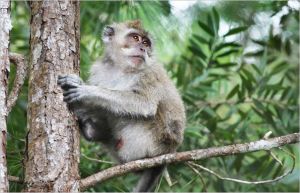
Information uncovered by Action for Primates points to a failure by Mauritius to comply with its obligations under the CITES Convention in issuing CITES permits for the export of long-tailed macaques—a CITES Appendix II listed species—and their export from Mauritius during which they are subjected to inhumane and lengthy air transportation. Dr Buyukmihci, veterinary adviser and co-founder of Action for Primates, has written to the CITES Secretariat requesting that it investigate the status of Mauritius's compliance with its obligations under Article IV of the CITES Convention.
There has been an alarming escalation in the numbers of long-tailed macaques exported from Mauritius in recent years for research and testing purposes—primarily to the USA—up from 7,691 individuals in 2019 to 14,623 in 2024, and a resurgence of the wild-caught trade. According to the CITES trade database, between 2020 and 2023, 12,304 long-tailed macaques sourced as wild-caught were exported (1).
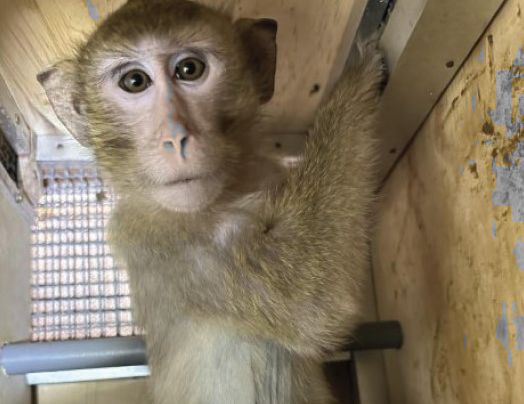
Under clause (a) Article IV of the Convention on International Trade in Endangered Species of Wild Fauna and Flora (CITES) (Regulation of Trade in Specimens of Species Included in Appendix II). This clause states that an export permit shall only be granted when a Scientific Authority of the State of export has advised that such export will not be detrimental to the survival of that species
(2). This involves establishing a quota and providing an explanation of the scientific basis by which it was determined that the quota would not be detrimental to the survival of the species in the wild. These are known as Non-Detrimental Findings or NDFs (3).
A request was made to the National Parks and Conservation Service (the Mauritius CITES Management Authority) seeking information on what basis CITES export permits were issued for the export of wild-caught long-tailed macaques between 2020 and 2023, and on what basis they were currently being issued. In response, the director stated that NDFs for long-tailed macaque exports are not necessary:
The Non Detriment Finding (NDF) for the wild monkeys in Mauritius is not warranted given that the population is an exotic invasive species and that extraction has no incidence in the wild.
This policy, however, is at odds with what is required by CITES. NDFs are required by the Convention for any export of a CITES-listed species, regardless whether the population is native or introduced.
An NDF usually involves population surveys. No population census on wild long-tailed macaques, however, has been carried out in Mauritius since the 1980s. If there are no recent population surveys, the Mauritius authorities cannot conclude that the export trade does not have an impact. Wild long-tailed macaques are also captured by macaque farms for breeding purposes, which has a further impact on the population.
The Mauritius authorities have regularly pushed the narrative that, as an 'introduced' species, the long-tailed macaque in Mauritius is a 'pest' and, by implication, not worthy of conservation concerns. The species is persecuted, and it is in the interests of those who benefit commercially from the primate trade for the people of Mauritius to maintain a negative attitude towards the macaques, to view them as a problem and trapping and exporting as solutions.
Concerns were also raised about Mauritius' compliance with clause (c) of the Article IV of the CITES Convention: ...a Management Authority of the State of export is satisfied that any living specimen will be so prepared and shipped as to minimize the risk of injury, damage to health or cruel treatment...
Long-tailed macaques exported from Mauritius by air are being subjected to inhumane and lengthy transportation times. For example, in May 2025, Action for Primates received information that 800 long-tailed macaques transported by air from Mauritius to Miami, were subjected to a journey of over 43 hours, involving seven flights and stop-overs in Ethiopia, Greece, France, Iceland, Boston, New York and Miami; there was an eight and a half hour stop-over in Paris. The 43 hours does not include the hours spent at Sir Seewoosagur Ramgoolam International Airport, nor the unloading in Miami and the onward journey by road to the US importer's premises.
We believe that the Mauritius CITES Management Authority is allowing unacceptable and inhumane conditions for exporting long-tailed macaques.
For more information, read this article by environmental journalist, Tracy Keeling::
Probe points to rule breach in Mauritius' lab monkey business. Mauritius says the sustainability assessments required under global regulations are 'unwarranted' in its trade of long-tailed macaques
: https://tracyk.substack.com/p/probe-points-to-rule-breach-in-mauritius
References:
An export permit shall only be granted when the following conditions have been met: (a) a Scientific Authority of the State of export has advised that such export will not be detrimental to the survival of that species; (b) a Management Authority of the State of export is satisfied that the specimen was not obtained in contravention of the laws of that State for the protection of fauna and flora; and (c) a Management Authority of the State of export is satisfied that any living specimen will be so prepared and shipped as to minimize the risk of injury, damage to health or cruel treatment...(https://cites.org/eng/disc/text.php)
10 August 2025: In Iran, rhesus macaques used to study impact of high voltage power transmission
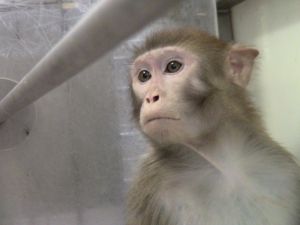
Two adult male rhesus macaques were used in an inhumane and wasteful experiment simulating human exposure to high voltage power transmission lines in Iran (Aliyari et al 2025). The work was approved by the Baqiyatallah University of Medical Sciences institutional review board.
The macaques were kept in a controlled environment for 12 months to adapt. One of the individuals was exposed to a high voltage electric field for 4 hours a day for a month. The electric field was simulated using two metal sheets, each two x two metres. A crane was used to place the sheets at the bottom and on top of a cage, which was only one x one x one metres. The sheets were exposed to a voltage of six kV to create the electric field. The other macaque was kept outside this field as a "control".
Tests designed to determine memory were done before, during and after the exposure to the electric field. The tests comprised the ability of each macaque to find food comprising a peanut in different settings, several times a day. The macaques were deprived of food for 17 hours before tests. The macaques were also subjected to magnetic resonance imaging (MRI) to determine activity in the brain. The fate of the macaques was not stated.
These two macaques had to live in tiny cages, under laboratory conditions, deprived of any meaningful social contact, in a scientifically poor study that had no value for human health. The researchers pointed out that there have already been numerous studies in humans to determine the effects of electromagnetic radiation. Given that literally tens of thousands of humans live in close proximity to high voltage transmission lines worldwide, humane and relevant studies could be carried out with them. This experiment is just another example of the unwillingness of the research industry to use and improve methodologies that do not depend on subjecting non-human primates to exceptionally inhumane experiments and conditions.
Reference:
Aliyari, Hamed; Hosseinian, Mohsen; Menhaj, Mohammad Bagher; Sahraei, Hedayat; Shabani, Mohsen and Kazemi, Masoomeh 2025-01-01 Effect of High-voltage Electrical Field Exposure on Neurobiological Factors and Visual Working Memory of Macaques Basic and Clinical Neuroscience 16(Spec Issue):251-264
16 July 2025: Woman calling herself "Sadistic Queen" given jail sentence in US baby monkey torture case
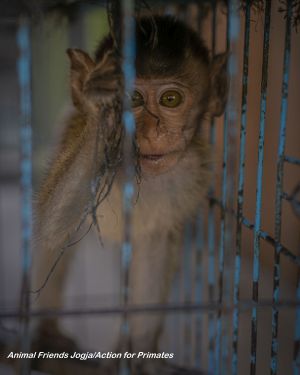
Action for Primates and Lady Freethinker applaud the jail sentence handed down to a US woman convicted of Conspiracy to Create and Distribute Animal Crushing Videos. Stacey Storey, of Alabama, has received a three-year prison sentence and three years supervised release, in the US District Court, Eastern District of Virginia, after pleading guilty to conspiracy to create and distribute 'animal crush' videos.
Storey, who called herself "Sadistic Queen" and "Sadistic Mind", was a member of an online monkey torture group that facilitated the torture, murder and sexually sadistic mutilation of baby long-tailed macaques in Indonesia. She sent payments and instructions on how to torture the monkeys and then distributed the videos within the group. In June 2022, with the words Enjoy this one ladies and gents
, Storey circulated a horrifying video depicting the brutal torture and killing of a baby monkey who was sealed inside a jar of red ants before being sodomised with an object.
In June 2023, law enforcement seized Storey's electronic devices, which contained over 675 videos and 11,000 images depicting animal crushing. Three of her co-conspirators in the US have also received jail sentences: Michael Macartney, who used the name "Torture King", was jailed for three years and six months; Jeffrey Radtke received a 21-month prison sentence, followed by three years of supervised probation, and Drexel Venero, who used the name "Mr Ape", was given an 18 month prison sentence with three years supervised release.
Action for Primates and Lady Freethinker first exposed the sadistic world of online monkey torture groups in 2021, and since then have continued to investigate as various other groups sprung up dedicated to the torture, mutilation and killing of infant monkeys. We are extremely grateful to US law enforcement agencies for tracking down and prosecuting these depraved and perverted individuals responsible for the most unimaginable pain and terror inflicted upon baby monkeys.
This sentence is the latest in a global spike in arrests and charges for crimes in which sadistic individuals purchase torture videos from "filmmakers" in Indonesia through encrypted chats on Telegram, using cryptocurrency and other online payment methods. The videos have often been re-posted on major social media sites such as Facebook and YouTube.
Creating and distributing 'animal crush' videos is a federal crime in the US, punishable by up to seven years in prison under the Preventing Animal Cruelty and Torture Act (PACT Act).
Nina Jackel, founder, Lady Freethinker, stated: Such brutal and horrific crimes against monkeys or any other animal must not be tolerated. The torture inflicted on young macaques for these videos is more disturbing than any other abuse I've come across in more than a decade of animal advocacy work. I'm grateful to law enforcement for their diligence in investigating these unthinkable acts and seeking justice.
Sarah Kite, co-founder, Action for Primates, stated: We welcome the prison sentence given to Stacey Storey for her involvement in facilitating the violent, sadistic torture and killing of baby monkeys. We are extremely grateful to US law enforcement for tracking down and prosecuting these depraved individuals. These people need to know that there are legal consequences to their vile activities. We fervently hope this prosecution and punishment will act as an important deterrent to others.
10 July 2025: Rhesus macaques slaughtered for their wombs in callous USA research
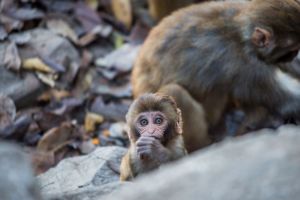
Fourteen adult female rhesus macaques were slaughtered just to get their wombs (uteruses) (Fodera et al 2025). The study was done at the University of Wisconsin-Madison, approved by their animal use committee and funded through public funds provided by the National Institutes of Health and the National Science Foundation.
The rhesus macaques were apparently of no further use as breeding individuals at the Wisconsin National Primate Research Center. Three were non-pregnant and 11 were pregnant (three early in their 2nd trimester, and three early and five late in their 3rd trimesters). The researchers stated that they recruited
these individuals, as if the macaques had a choice.
While under anaesthesia, the uterus and cervix were removed from the non-pregnant macaques and those who were in their 2nd and early 3rd trimesters. The researchers then killed the mothers and their foetuses (euphemistically referred to as euthanized
).
The pregnant macaques who were in their late 3rd trimester had their babies removed by caesarean section before the mothers were killed. The babies were transferred to a neonatal incubator to be kept alive and used for research or breeding at some point in the future. As a result, they were brutally and forever deprived of the love and nurturing of their mothers.
Nothing was learned from this callously inhumane study that would in any way be useful to human reproductive health. The researchers were aware that similar information was already available through studies on humans. Their interest was apparently only in demonstrating that the rhesus macaque could be used as a model
to study some aspects of reproductive issues in humans. The macaques were treated as disposable commodities once it was decided that they were no longer needed in the breeding colony. After years of captivity, pregnancy and having their infants taken away to be used in research, rather than show some humanity to these sentient, intelligent and social beings by releasing them to a sanctuary to live out the remainder of their lives, the University of Wisconsin-Madison decided instead to slaughter them for their reproductive body parts. The public are often told that researchers care 'deeply' for the animals they use (and abuse). This 'experiment' demonstrates how untruthful are such pronouncements.
Reference:
7 July 2025: Marmosets subjected to inhumane surgery and brain research in Japan

Researchers in Japan subjected marmosets to invasive skull surgery and extreme restraint in order to study a phenomenon known as saccades (eye movement) that could and has been easily studied in humans (Amly et al 2025). The Animal Ethics Committee at Kyoto University approved this brutal treatment.
One female and two male adult common marmosets were each implanted with a head post—which is cemented or screwed to the skull. After recovering from this very painful surgery, they were forced to view a monitor and respond to visual stimuli in order to record the movement of their eyes and how they focused on the stimuli. Because this required the marmosets to hold their heads still—in an unnatural position—the head posts were used to immobilise the marmosets, forcing them to look straight ahead at the screen. It was not mentioned in the report, but there would had to have been additional restraint of their bodies.
A tiny amount (0.05 mL) of banana-flavoured pudding was used to 'reward' the marmosets for correct responses. The fate of the individuals once the experiment had ended was not stated.
Tragically for the marmoset, this non-human primate species is increasingly being used in neurophysiological research because of their size and less expense of imprisoning them in captivity. The information gained by this inhumane experiment has no relevance to humans in whom similar studies have been and can continue to be done—humanely and reliably. Once again the research industry is violating the principles of the 3Rs, something they claim to adhere to rigorously.
Amly, Wajd; Chen, Chih-Yang; Onoe, Hirotaka and Isa, Tadashi 2025-04-01 Different properties of successful and error saccades in marmosets Neuroscience Research 213:60-71
10 June 2025: Woman in Scotland jailed in baby monkey torture case
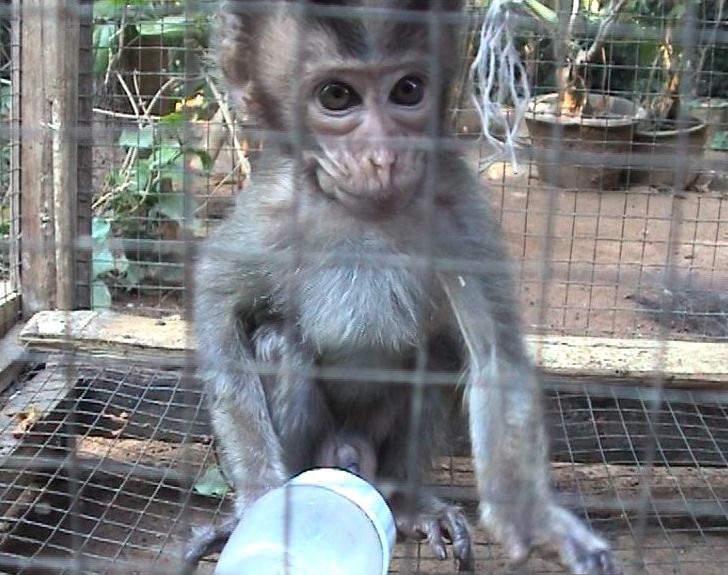
Natalie Herron in Scotland, has been sentenced to two years and three months at Airdrie Sheriff Court today for her part in a global monkey torture ring that paid for and ordered baby monkeys to be sadistically tortured and killed in Indonesia, to create videos to be circulated online.
The sentence has been welcomed by Action for Primates and Lady Freethinker, who have spent four years investigating the sadistic world of online monkey torture groups. The conviction is part of an international crackdown by law enforcement agencies in the UK and the USA against those people who facilitate the torture of baby monkeys. Several people in the UK and USA are already serving or have served prison sentences.
Herron was a member of the same monkey torture group as two women from England—Adriane Orme and Holly LeGresley—who were both sent to prison in November 2024 (https://www.westmercia.police.uk/news/west-mercia/news/2024/november/women-jailed-for-monkey-torture-offences/). The group was run by Michael Macartney, who called himself the "Torture King". Macartney is currently serving three years and four months in prison in the USA for conspiring to make and distribute "animal crush" videos. He ran several online Telegram groups that facilitated the torture, murder and sexually sadistic mutilation of baby long-tailed macaques as 'entertainment'. Several other members of the group are also serving time in US jails.
In the group on Telegram, Herron shared videos depicting the torture and abuse of baby monkeys, and enthusiastically discussed her enjoyment at watching horrific and disturbing videos in which monkeys suffered unimaginable agony and distress. These videos included placing an infant into a food blender; sealing an infant inside a jar with red ants; gouging out the eyes of an infant; and wrapping an infant tightly in sticky plaster in the shape of a ball, who was then kicked around. Examples of comments posted by Herron include:
Or watch them be blitzed in blenders and scalped, dicks cut off, set alight. If only my family and friends knew they'd never look at me the same again lol.
Torch its whole face off until it's just skull and melting skin haha.
We finally got our ants in a jar. Phenomenal!
Haven't you seen the video where they cellotape it into a ball? It's awesome.
Along with LeGresley, Herron was also involved in organising a poll amongst group members to suggest and then vote on which method of torture they wanted to see inflicted upon a monkey in the next video they were funding. The choices included sealing a monkey inside a jar with red ants, applying a painful substance to the wounds created by a cheese grater or gluing together various parts of a monkey's body.
Sarah Kite, co-founder and spokesperson for Action for Primates, stated: We welcome the sentence given to Herron and are extremely grateful to UK law enforcement for continuing to track down and bring to justice these sadistic and depraved people involved in online monkey torture groups. The perverted 'enjoyment' Herron and others obtained from facilitating and watching baby monkeys being abused and brutalised in the most sickening and horrifying ways shows a level of depravity that must never be tolerated.
Nina Jackel, Founder, Lady Freethinker, stated: The suffering endured by helpless, infant monkeys for online videos is heartbreaking, and the brutal nature of these acts is sickening. The perpetrators involved in the creation, funding, or sharing of animal torture content for human 'amusement' must be held accountable.
Members of these online torture groups are primarily active on platforms such as Telegram and get 'pleasure' from watching helpless and vulnerable infant monkeys in terror and pain, fighting for their lives. The extreme cruelty inflicted upon the baby monkeys included being set alight; having parts of their body cut off, including limbs, genitals, fingers and toes; their bones broken with a hammer; their heads squeezed in a clamp; beaten viciously; and having their eyes drilled out with a power tool.
The evidence obtained during the investigations by Action for Primates and Lady Freethinker has been given to various law enforcement agencies and spurred the BBC investigation and documentary about online monkey torture gangs—The Monkey Haters—which helped lead to the inclusion of animal cruelty in the UK Online Safety Act (https://www.bbc.co.uk/news/world-65951188 and https://www.bbc.co.uk/news/world-65951188).
Disturbingly, many graphic and violent videos paid for by members in Telegram groups—depicting extreme violence and sexual abuse inflicted upon baby monkeys, including genital mutilation—have appeared on mainstream social media platforms such as Facebook.
27 May 2025: Macaques in Greece implanted with electrodes and metal head posts in brutal brain research

Two rhesus macaques in Greece were subjected to highly invasive head surgery as surrogates for humans (Sapountzis et al 2025). The goal of the work was to see how the brain functioned when the macaques were presented with a visual stimulus. The macaques had to be 'trained' in order to respond to certain stimuli.
Each macaque was anaesthetised and subjected to a craniotomy in order to access the brain and implant electrodes. During the surgery, a metal head post was attached to the skull. After recovery from surgery, the individuals were restrained in what the researchers euphemistically referred to as a chair. Their heads were rigidly restrained by the head post and, combined with the chair restraint, they could not make any postural adjustments or do anything to relieve any discomfort they experienced. A computer screen was placed in front of them and were 'rewarded' if they 'performed' in the way desired by the researchers. The length of time and number of recording sessions was not stated, nor was the ultimate fate of macaques.
Macaques are not surrogates for humans and the data obtained from them are not applicable to humans. This experiment—which caused substantial suffering for the macaques, was approved by the Veterinary Authorities of the Region of Crete and received public funds from the European Union—could easily have been done in human volunteers. Not only would the results be directly applicable to humans, it would be humane and conform to the ethical norm of requiring informed consent, the latter not feasible with macaques. The researchers cited numerous similar studies in humans, which begs the question of why macaques were used.
Action for Primates condemns all experimentation on non-human primates. We contend that nothing can be gained to advance the human situation that can possibly be justified by doing to the non-human primates what we would never allow to be done to humans.
Sapountzis, Panagiotis; Antoniadou, Alexandra and Gregoriou, Georgia G. 2025-01-27 Diverse neuronal activity patterns contribute to the control of distraction in the prefrontal and parietal cortex PLoS Biology 23(1):e3003008
|
Primate chairs:
So-called 'primate chairs', such as those manufactured by Crist Instrument Co, are restraint devices which secure the individual in an unnatural sitting position. Further restraint is often used through a neck plate which goes around the neck to prevent side-to-side or front to back movements of the head. The head may be severely restrained through the use of a post surgically implanted into the skull and held by part of the chair. Depending on the procedures being done, the arms and legs may be secured further by taping them to the chair supports. |
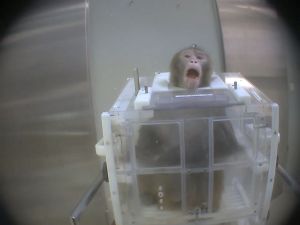
|
4 May 2025: NIH announces new initiative to reduce animal use in US research
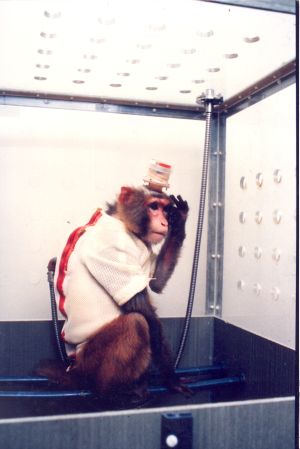
The National Institutes of Health (NIH) in the USA has announced that it is ...adopting a new initiative to expand innovative, human-based science while reducing animal use in research
. Although inexplicably and disappointingly continuing to support the use of non-human animals in research, the NIH has acknowledged that some areas of research have been ...inconclusive on the efficacy of translating the results of animal models to human diseases...
, and is advocating for new and emerging technologies that use information obtained from people. Such an approach aligns with the recent initiative announced by the US Food and Drug Administration to reduce testing in animals.
Action for Primates welcomes this initiative as a step in the right direction, and certainly an encouraging shift away from the years of tunnel vision regarding the use of animals in research. We hope this initiative will be the beginning of a paradigm shift that is so desperately needed to bring an end to the immoral exploitation of animals in research and toxicity (poisoning) testing. Action for Primates has steadfastly campaigned against the inhumane—and irrelevant—research using non-human primates that has been carried out globally, but in particular at US institutions supported by the taxpayer through NIH funds. These include the Oregon National Primate Research Center, and Johns Hopkins University School of Medicine.
In particular, we have shone a light on the regular and substantial funding by the NIH of incredibly inhumane experiments in which non-human primates, such as baboons and macaques, are being forced to become 'alcoholics' and cocaine 'addicts'; forcing them to consume cannabis; altering the diets of pregnant monkeys and then killing the babies, either while in the uterus or after they are born, causing untold distress for the mothers; studies which not only are scientifically unreliable, but also cause substantial suffering and death for the monkeys used. We have pointed out that such research is fiscally irresponsible, and that whatever funds are being expended to support animal research would be put to better use in helping people directly.
Dr Jay Bhattacharya, the new director of the NIH, has stated: For decades, our biomedical research system has relied heavily on animal models. With this initiative, NIH is ushering in a new era of innovation. By integrating advances in data science and technology with our growing understanding of human biology, we can fundamentally reimagine the way research is conducted—from clinical development to real-world application. This human-based approach will accelerate innovation, improve healthcare outcomes, and deliver life-changing treatments. It marks a critical leap forward for science, public trust, and patient care.
Director Bhattacharya's statements are in line with those made over ten years ago by Dr Elias A Zerhouni, a previous director of the NIH, who stated We have moved away from studying human disease in humans...We all drank the Kool-Aid on that one, me included...The problem is that it [animal-based research] hasn't worked, and it's time we stopped dancing around the problem...We need to refocus and adapt new methodologies for use in humans to understand disease biology in humans
.
29 April 2025: Macaques deliberately inflicted with abdominal wounds and then killed in Japan
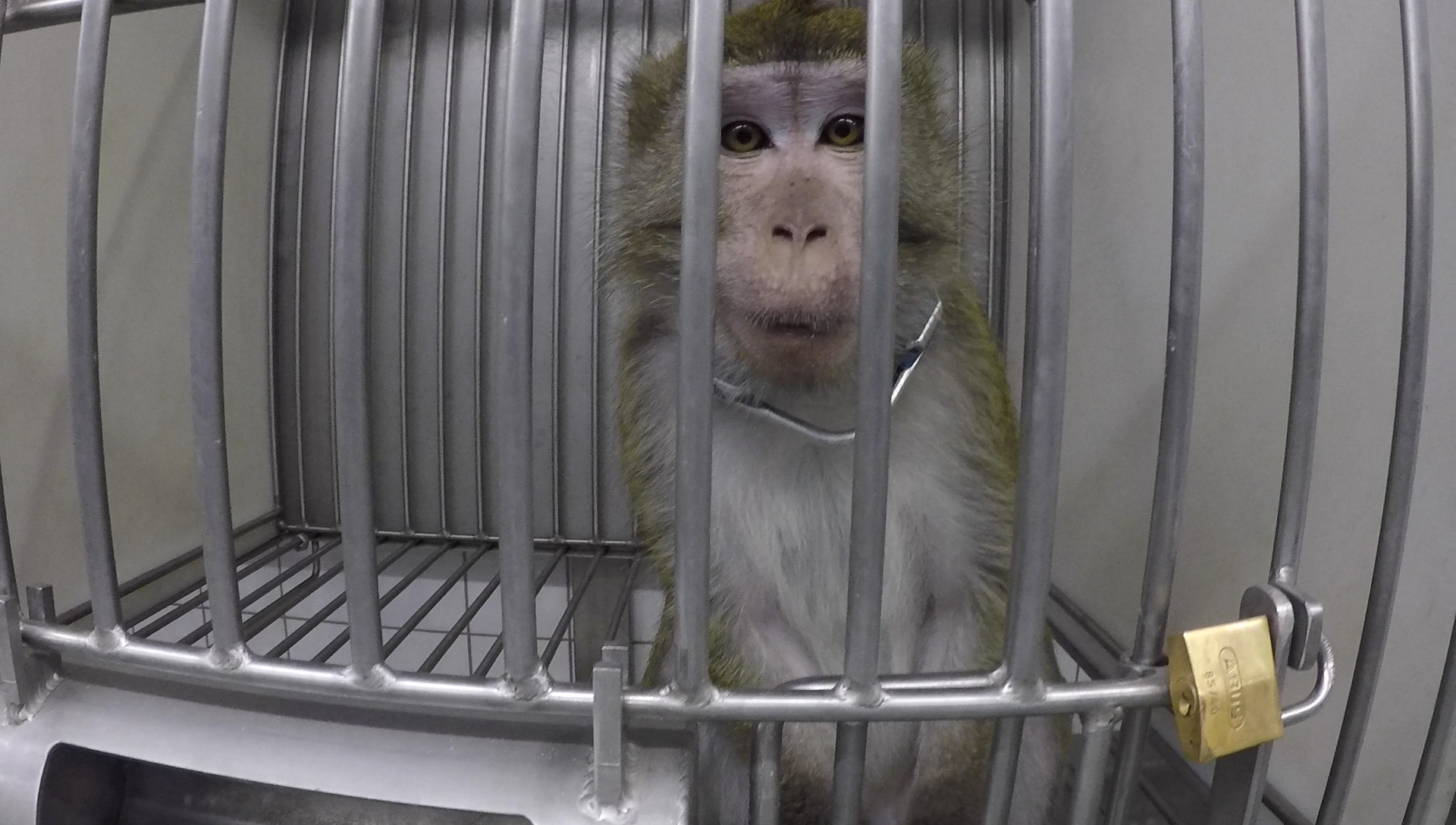
Researchers at the National Institute of Biomedical Innovation, Health and Nutrition in Japan, deliberately caused injury to the abdominal walls of long-tailed macaques by incision, abrasion and suturing in an attempt to develop an animal model
of abdominal scarring in people (commonly referred to as postoperative adhesions) (Nakagawa et al 2025). The trauma inflicted upon the macaques caused peritonitis (inflammation of the lining of the abdominal cavity), which is a very painful condition and the scars produced can continue to cause pain indefinitely.
Six female (some who were pregnant) and nine male long-tailed macaques, 6–19 years old, were forced to undergo multiple abdominal surgeries over a period of several weeks, including caesarean sections. During the initial surgery, each macaque had the lining of their abdomens damaged sufficient to cause inflammation as well as the insertion of foreign material (sutures) in order to cause further inflammation. In other surgeries, tissue from the damaged areas was removed for study. Although the macaques received chemical pain relief for a few days after the surgeries, no further pain relief was provided. There was no mention of what the macaques experienced as a result of this major invasion of their body cavities. Several of the macaques were killed (euphemistically referred to as euthanized
by the researchers).
Abdominal surgery is common worldwide in humans. Postoperative adhesions can occur after surgery in people causing obstruction, chronic pain and infertility in women. There are literally thousands of human patients who could be recruited for ethical and human-relevant studies to determine how scarring occurs and what to do to prevent this. There is no scientific need to continue forcing non-human primates to be unwilling 'surrogates' for humans.
Nakagawa, Kenji; Yamazaki, Masaki; Tanimura, Hiromi; Sakaguchi, Narumi; Kohara, Miho; Sato, Izumi; Azuma, Masahiro; Nishimoto-Kakiuchi, Ayako; Kato, Atsuhiko; Kitazawa, Takehisa; Konno, Ryo and Sankai, Tadashi 2025-02-27 Development of a novel postoperative adhesion induction model in cynomolgus monkeys with high reliability and reproducibility Scientific Reports 15(1):7102
25 April 2025: US man who sent out 'Wish List' of monkey torture ideas is jailed on 'Crush' charges
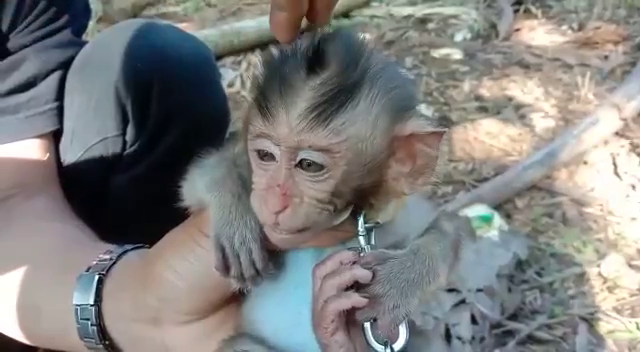
Action for Primates and Lady Freethinker have welcomed the jail sentence handed to Drexel Venero, a US individual, convicted of Conspiracy to Create and Distribute Animal Crushing Videos.
Venero, from Maryland and who had pleaded guilty to the charges, has received an 18-month sentence with three years' supervised release. Using various names, including "Mr Ape", Venero created his own private online groups on an encrypted messaging platform for the purpose of creating and distributing animal crush videos depicting the horrifying torture and killing of baby monkeys. Venero joined with co-conspirators to pay for and have torture videos made for the group by people in Indonesia. At one point, he sent out a "wish list" of torture requests which, according to court documents, included hammering a monkey's limbs until they were flat; smashing their genitalia; pulling their teeth; cutting off their eyelids; and using a C-clamp to crush their skull slowly.
This sentencing is the latest in a series of arrests, convictions and imprisonment following Action for Primate's and Lady Freethinker's work exposing a monkey torture group called "Million Tears"—led by Ohio man and former school teacher Ronald Bedra, who went by the online alias "DemonSwordSoulCrusher". Bedra was recently sentenced to 54 months in prison for conspiracy to create and spread monkey torture videos. Bedra was a leader in an online group called "Million Tears", which commissioned the sexual abuse, torture and killing of infant monkeys. The evidence uncovered during an investigation by Action for Primates and Lady Freethinker—including videos and screenshots of chats from him and other group members—was handed over to the US authorities.
Members of the "Million Tears" group could pay for their own "private monkey" to be filmed while being tortured through the member's chosen method, or several members could make smaller contributions towards a fee for their share of a "community monkey"—which allowed participants to request specific, depraved acts of cruelty and torture to be inflicted on this shared monkey and decide how the monkey was to be killed.
Following "Million Tears", various other groups sprung up dedicated to the torture, mutilation, and killing of infant long-tailed macaques.
Action for Primates and Lady Freethinker assisted Homeland Security Investigations with its investigation into Drexel Venero. Venero's sentencing follows that of Virginia man Michael Macartney, known online as "The Torture King", who was recently sentenced to 40 months in prison for his role in a global monkey torture ring. Macartney was featured in the BBC documentary The Monkey Haters—for which Lady Freethinker and Action for Primates provided intelligence and information.
Baby monkey torture videos are often purchased through encrypted chats on Telegram, using cryptocurrency and other online payment methods. The videos have been re-posted on major social media sites such as Facebook and YouTube.
Creating and distributing "animal crush" videos is a federal crime in the US, punishable by up to seven years in prison under the Preventing Animal Cruelty and Torture Act (PACT Act). Prosecutions in the US and UK span late 2023 through April 2025—and more are expected to follow. They include:
Additionally, several people in Indonesia have been sent to prison for their involvement in the torture and killing of monkeys:
Sarah Kite, co-founder, Action for Primates, stated: We welcome the prison sentences handed down to Venero and others involved in facilitating the violent and sadistic torture and killing of baby monkeys. These people need to know that there are legal consequences to their vile and depraved activities. We sincerely hope this prosecution and punishment will act as an important deterrent to others.
Nina Jackel, founder, Lady Freethinker, stated: The immense suffering inflicted on helpless infant macaques purely for human 'amusement' in these underground groups is heartbreaking and must not be tolerated. I'm grateful to law enforcement for their diligent work in investigating these brutal acts and seeking justice.
10 April 2025: New findings show disturbing voyeuristic and sexually violent videos of baby monkeys available on social media

New findings from Action for Primates and Lady Freethinker have revealed that sexual exploitation and abuse of monkeys on camera is available on social media platforms—posing a danger to monkeys and children. Often first posted to encrypted platforms such as Telegram, the full range of monkey sexual abuse videos has spread to mainstream social media platforms. Videos were found across YouTube and Telegram—but Facebook hosts the greatest number of these illicit videos.
Voyeuristic videos focused on the genitalia of captive infant monkeys circulate on major social media platforms—and include the following areas of abuse:
Action for Primates and Lady Freethinker first began exposing the sadistic world of monkey torture videos three years ago when they investigated an online group called "Million Tears", where viewers in the US and UK paid video operators to carry out the abuse in countries such as Indonesia. Former US teacher Ronald Bedra, a leader of the group, was recently convicted and imprisoned for his role in commissioning and distributing videos containing sadistic violence, including sodomising the baby monkeys with a heated screwdriver. Other individuals in the US awaiting trial have been charged with conspiracy to create and distribute "animal crush" videos depicting monkeys having their genitals burned and mutilated. Nicholas Dryden, another US individual, has been charged with allegedly paying a child in Indonesia to carry out gruesome acts of sexual violence against a monkey on camera. In the UK, Peter Stanley was recently imprisoned for 20 months after he pleaded guilty to charges under the Obscene Publications Act for distributing monkey torture videos on Facebook, depicting extreme violence and sexual abuse, including genital mutilation.
Perpetrators of animal abuse may also go on to commit acts of violence against people. Lady Freethinker and Action for Primates are calling on social media platforms to urgently moderate content, enforce their own guidelines and crack down on animal abuse for the safety of monkeys, children and the greater public.
Untold numbers of baby monkeys suffer from sadistic and prolonged sexual torment, with spectators convening online to fund and promote the abuse,
says Lady Freethinker Founder and President Nina Jackel. It's time for social media platforms to finally address this problem and put in the needed resources to end animal torment for clicks.
By allowing these people to operate on their platforms, social media companies are enabling animal cruelty fetishists to connect and distribute their perverted and depraved harmful content, making such videos available for others, including children, to access and view,
said Action for Primates co-founder Sarah Kite. We urge platforms to take swift and meaningful action to identify and remove all content that promotes or glorifies this disturbing sexual exploitation and abuse of monkeys.
4 April 2025: Meta's Platform Enables and Rewards Monkey Abusers Despite Policy Violations
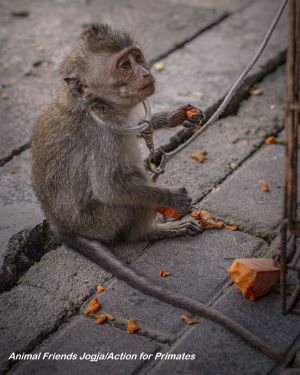
Social media company Meta is allowing—even rewarding—content that features severe abuse of monkeys on its platform, Facebook. Despite clear violations of Meta's policies, over the past three weeks, Facebook has failed to remove disturbing videos from public pages that depict abuse and violence inflicted upon monkeys.
Action for Primates became aware of two public Facebook accounts sharing monkey abuse content. The content shows macaques, usually infants, being drowned, slapped and choked. The pages collectively have over a hundred thousand followers, many of whom appear to be overt sadists, giving positive reactions to the abuse videos, using emojis including "thumbs up" and "laughing face". Some comments seem to actively encourage physical abuse. The pages and individual videos were reported to Facebook, who failed to take action.
Meta's existing policies explicitly prohibit content that depicts animal cruelty, yet enforcement remains inconsistent. Further, under the new UK Online Safety Act, social media companies are required to remove and prevent illegal content and content that is harmful to children, including animal cruelty, from being displayed on their platforms.
Appallingly, one of the accounts has been awarded a Creator Badge
by the platform, a feature that promotes and incentivises content creators for engagement. According to Meta's own guidelines, the Creator Badge is awarded to accounts that meet quality, originality, and integrity standards
, yet the content features violent captions. This badge also requires creators to post at least one Reel, a 30-second video, per week to maintain it, effectively encouraging abusive accounts to produce and share more harmful content. By failing to enforce its policies, Meta is not only allowing animal abuse to persist on Facebook, but also appears to be indirectly encouraging and rewarding it.
Asia for Animals Coalition (SMACC), of which Action for Primates is a member, has previously found Facebook to be one of the worst platforms for animal abuse content. In their 2023 report, The cruelty you don't see: The suffering of pet macaques for social media content, SMACC found monkey abuse videos were most commonly found on Facebook, and the most common theme of cruelty being deliberate physical torture
.
Investigations by Action for Primates and Lady Freethinker, first uncovered the existence of sadistic online monkey torture groups to facilitate the torture and abuse of monkeys by funding and ordering torture videos to be made and then shared. The BBC investigation and documentary exposed one such online ring of monkey abuse perpetrators in their The Monkey Haters documentary. Several individuals have been convicted and imprisoned in the UK, USA and Indonesia as part of an international effort by law enforcement agencies. In the UK, Peter Stanley was sentenced in 2024 to 20 months' imprisonment after pleading guilty to three charges under the Obscene Publications Act 1959. Sarah Kite, co-founder of Action for Primates, reported Stanley's activities to the police and provided witness evidence in the case. Stanley was convicted for uploading three videos depicting extreme animal cruelty to a Facebook group dedicated to monkey torture.
Action for Primates, with other groups, are calling for the immediate removal of these accounts and others sharing similar content, a full review of Facebook's content moderation practices, and transparency on how abusive content continues to generate profit. Enforcement action also needs to be taken to ensure that Meta fulfils its duties under the Online Safety Act.
Sarah Kite, Action for Primates, stated: It is outrageous that videos depicting violence and abuse inflicted upon baby monkeys continue to appear on Facebook. By allowing these people to operate and post such content, Meta is not only violating its own policies, but it is also facilitating criminal activity on its platforms and failing to comply with its obligations under the Online Safety Act.
06 March 2025: Japanese macaques incarcerated for years to be used in brain experiments in Japan
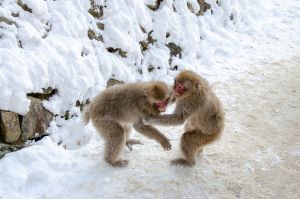
Two male Japanese macaques (also known as snow monkeys) were used in this invasive brain function research at the Tokyo Metropolitan Institute of Medical Science, Japan (Nakayama et al 2025). This experiment was approved by the institution's animal use committee.
The macaques had been previously used by the researchers in similar experiments, and several years ago they were forced to undergo highly invasive surgery to implant devices in their brains. After being anaesthetised, the skin over their skulls was cut into to reach the bone. Screws were implanted and two plastic 'pipes' were attached to the skull with glue. A portion of the skull was removed so that a recording chamber could be implanted.
In this experiment, the macaques were restrained in a primate chair
and their heads were further restrained, presumably using the plastic 'pipes'. Their arms were also strapped to the chair, but their hands were free to move and press buttons. Electrodes were inserted into the brain. The macaques were trained to perform a button-press task that required them to press a small button with either the right or left hand or to press both buttons simultaneously with both hands based on the instructions provided through a computer screen display. The movement of their eyes and signals from the brain were recorded during testing. Correct responses allowed the macaques to receive a drop of apple juice
as a reward.
The ultimate fate of the macaques was not mentioned. There is very little information provided about these two individuals, despite having been incarcerated and used in research over several years at the Tokyo Metropolitan Institute of Medical Science.
The lives of these two macaques have been completely controlled, during which they have had to endure the stress of being held in laboratory conditions, major invasive brain surgery, severe restraint and coerced into carrying out tasks. Not only are the findings in these macaques of little use to understanding human brain function responsible for limb movement – the purported reason for doing the experiment – humane and human-relevant research of this type is regularly being done (albeit without subjecting volunteers to the brutal surgery used in the macaques). It is only through elegant and sophisticated studies on human volunteers and patients that progress will be made in understanding brain function and how to manage related illnesses
Nakayama, Yoshihisa; Yokoyama, Osamu; Hoshi, Eiji and Nishimura, Yukio 2025-01-21 Premovement neuronal activity in the primary motor cortex is associated with the initiation of ipsilateral hand movements in monkeys Neuroscience Research Neurosci Res. 2025 Jan 21:S0168-0102(25)00015-X. doi: 10.1016/j.neures.2025.01.005. Online ahead of print.(Neurosci Res. 2025 Jan 21:S0168-0102(25)00015-X. doi: 10.1016/j.neures.2025.01.005. Online ahead of print.):Neurosci Res. 2025 Jan 21:S0168-0102(25)00015-X. doi: 10.1016/j.neures.2025.01.005. Online ahead of print.
Primate chairs:

So-called 'primate chairs', such as those manufactured by Crist Instrument Co, are restraint devices which secure the individual in an unnatural sitting position. Further restraint is often used through a neck plate which goes around the neck to prevent side-to-side or front to back movements of the head. The head may be severely restrained through the use of a post surgically implanted into the skull and held by part of the chair. Depending on the procedures being done, the arms and legs may be secured further by taping them to the chair supports.
11 February 2025: Monkeys subjected to brutal surgery in the Netherlands
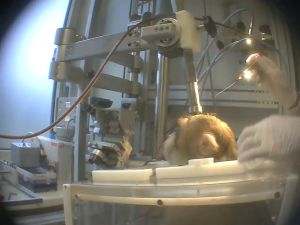
Rather than using their intellect and resources compassionately, researchers at the Netherlands Institute for Neuroscience (KNAW) in the Netherlands have prepared a 'how to' publication on abusing rhesus macaques in the name of science (Papale et al 2025. The work, which was publicly funded by the Dutch Ministry of Science and the European Union, was approved by Centrale Commissie Dierproeven of the Netherlands and published in the journal Neuron, produced by @CellPressNews.
The researchers disingenuously claimed that two adult male rhesus macaques (just referred to as monkey F and monkey N) participated
in this project, as if the monkeys had a choice and would have allowed themselves to be treated in such a brutal fashion! They were subjected to three head surgeries over a period of many months. The first was to implant posts into the skull to be used later to restrain the individuals' heads. The second surgery, several months later, involved dissecting away skin over the skull in order to implant a base plate
for use with a bundle of electrodes. Several months after that, an additional surgery (craniotomy) was done to open up the skull and implant electrodes that entered the brain. In order to do this, part of the cheek bone was cut out for access.
As part of the testing process, the macaques' access to fluids was controlled in order to 'motivate' them to carry out certain tasks. Testing involved restraining them in an unstated device, with their heads firmly fixed, while they 'performed' tasks for fluid rewards. No information was provided on how long the macaques were used in this research nor their ultimate fate.
The research industry continually claims that non-human primates are used in research only when absolutely necessary and only when there are no other alternatives available. This shameful project, which resulted in substantial suffering for the monkeys, demonstrates the meaningless nature of such assurances and a lack of commitment to stop using non-human primates. Funding agencies are largely to blame for this. For the sake of science, if for nothing else, they must support only humane and human-relevant alternatives or improving those that already exist, rather then paying researchers to concoct new ways of abusing non-consenting beings such as non-human primates.
Papale, Paolo; Wang, Feng; Self, Matthew W. and Roelfsema, Pieter R. 2025-01-09 An extensive dataset of spiking activity to reveal the syntax of the ventral stream Neuron S0896-6273(24)00881-X
Craniotomy:
This is a surgical procedure to access the brain. Typically, an area on the head is shaved. An incision is made through the skin and tissues underlying it, down to the surface of the skull, in such a way as to create a flap that can be pulled away to expose the skull. Depending on what type of access to the brain is required, holes may be drilled through the skull into the brain cavity, for example for injections, or a portion of the bone may be cut out in order to implant a bank of electrodes. When done, bone cement may be used to fill in the hole in the skull and the overlying tissues sutured.
20 January 2025: Baby monkeys subjected to chronic stress in Chinese laboratory to study depression
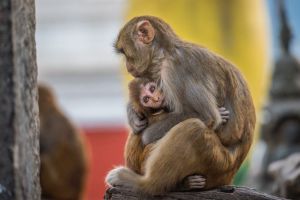
With no compassion or concern for the suffering they were inflicting, Chinese researchers studied the effects on chemicals in the spinal fluid of baby rhesus macaques after subjecting them to chronic stress and substantial suffering, including depriving them of their mothers, in order to induce 'depression' (Li & Feng 2024). This brutal treatment inflicted upon the baby monkeys was authorized by the Animal Care and Use Committee of Kunming Animal Research Institute
and had passed the ethical review of animal experiment welfare of Kunming Institute of Zoology, Chinese Academy of Sciences
. The results of the experiment were published in the journal Brain and Behavior, produced by @WileyGlobal.
Eight newborn male rhesus monkeys were used in this inhumane experiment. Four were removed from their mothers at birth, and were forced to live alone in an incubator for one month. After that, they were housed, again without their mothers, in pairs in small steel cages for about six months. The other four babies were allowed to remain with their mothers for seven months. All eight monkeys were then housed together for a period of time before being held in single cages.
Over the next several months, the babies were subjected to what the researchers characterised as unpredictable chronic stressors
which were designed to cause extreme stress and highly abnormal behaviour. These included further restriction of space; intimidation by unknown methods; keeping lights on for abnormal and prolonged periods; and withholding of all food for an unstated period of time. These stressful conditions were randomly administered.
Throughout the 'study', the babies were repeatedly removed from their cages and anaesthetised to get cerebrospinal fluid using a needle inserted into the lumbar (lower) region of their spinal canal. Removal of cerebrospinal fluid can cause severe headaches, backaches, nausea and vomiting, dizziness and other problems in humans. It is reasonable to assume that all non-human primates can also be subject to these complications. The ultimate fate of the babies was not stated nor was any information provided on the behaviour of the babies or the mothers whose babies were removed from them. The researchers did point out that their previous research using similar methodology caused significant depressive behavior
in macaques including reduced movement; stereotypical behaviours; huddling or curling up in their cages.
Li, Siyu and Feng, Xiaoli 2024-08-01 Dynamic quantitative monitoring of cerebrospinal fluid monoamine neurotransmitter markers during the modeling process of chronic stress-induced depression in monkeys (Macaca mulatta) Brain and Behavior 14(8):e3636
15 January 2025: CITES Secretariat recommends suspension in macaque trade from Cambodia
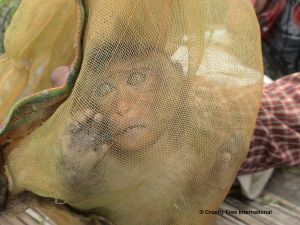
Action for Primates has welcomed a recommendation from the CITES Secretariat to suspend the trade in long-tailed macaques from Cambodia. This recommendation to the CITES Standing Committee will be voted on at a forthcoming meeting in Geneva on 3rd-8th February 2025. If accepted, the Standing Committee will recommend that all member countries stop importing long-tailed macaques from Cambodia.
This recommendation follows a CITES Review looking into the breeding and trade in long-tailed macaques, which has questioned the validity of the source codes used on CITES export permits, in particular claims of captive-breeding. A five-year US Fish and Wildlife Service (USFWS) investigation into monkey trafficking revealed that wild long-tailed macaques in Cambodia were being falsely labelled as captive bred at Cambodian facilities (including Vanny Bio Research (Cambodia) Corporation Ltd). Unable to breed enough long-tailed macaques to supply the demand from the USA import and user companies, it was claimed that Vanny Bio Research started to illegally source wild-caught monkeys and export them labelled as captive-bred. The USFWS subsequently denied permits for the import of macaques from Cambodia, but other countries, including Canada, which has imported thousands of macaques in recent years, have continued to do so. The exploitation of this species is driven by the global trade in long-tailed macaques for the research and toxicity (poisoning) testing industry.
Sarah Kite, co-founder, Action for Primates, stated: We welcome this recommendation by the CITES Secretariat. Action for Primates, with other wildlife and conservation groups, has for many years been pushing for greater conservation protection for the long-tailed macaque in Cambodia and neighbouring countries, raising concerns about the credibility of captive-breeding claims, the conservation status of the species and the impacts of increasing international trade on that status.
Investigation of the macaque trade in Cambodia was recently the subject of a Bloomberg documentary: "The Dirty Business of Monkey Laundering | Bloomberg Investigates".
Convention on International Trade in Endangered Species of Wild Fauna and Flora
![]()
![]()
![]()
![]()
![]()
Contact us via E-mail
Copyright © 2020-2026 Action for Primates. All rights reserved.